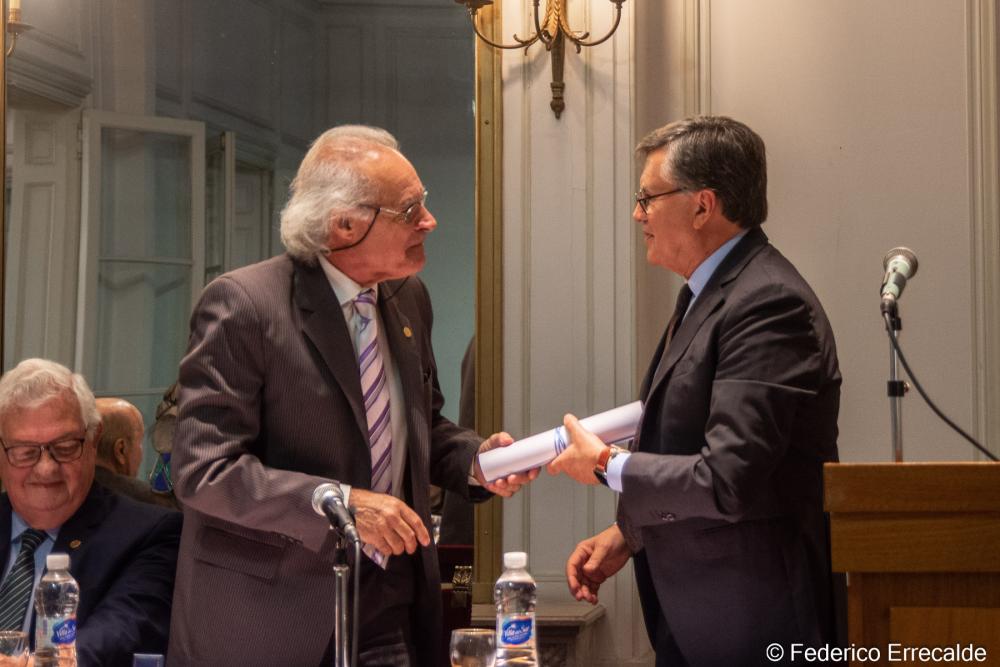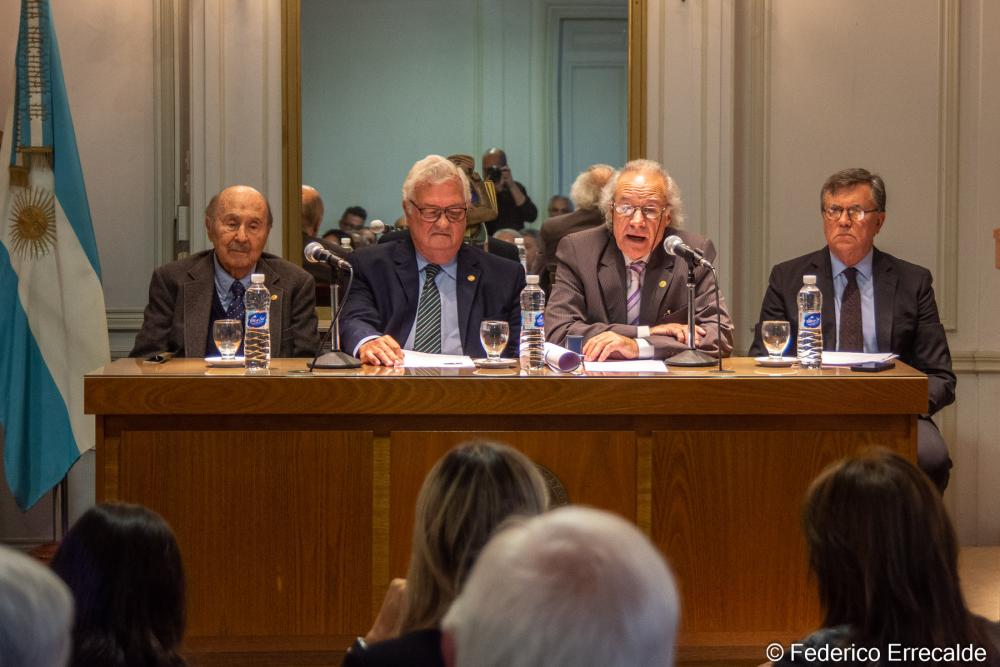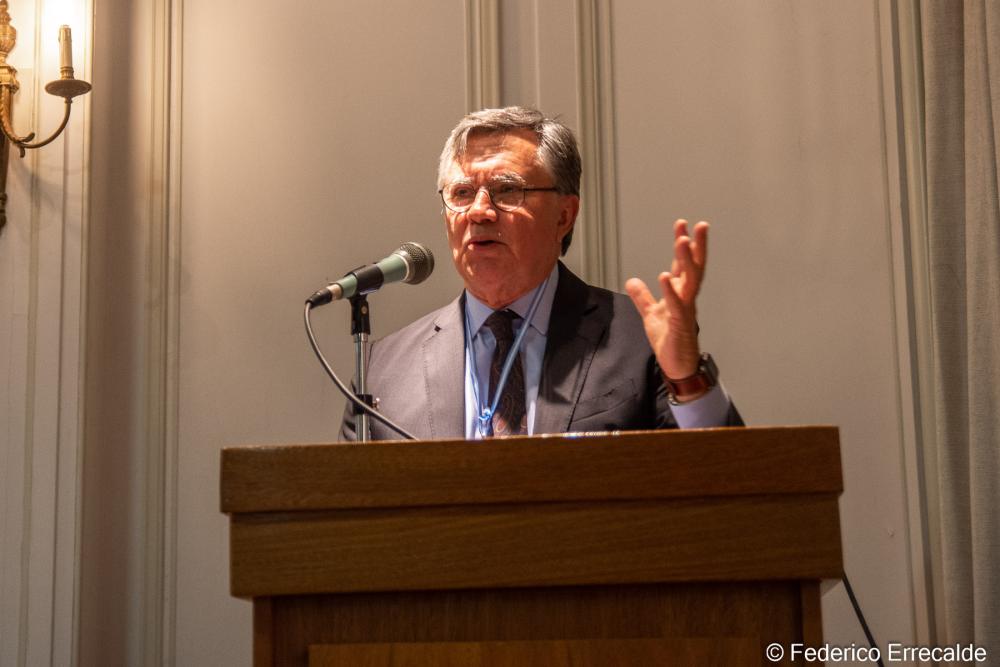IICA Director General Manuel Otero: newest member of Argentina’s National Academy of Agronomy and Veterinary Medicine

Buenos Aires, 24 April 2023 (IICA) - The Director General of the Inter-American Institute for Cooperation on Agriculture (IICA), Manuel Otero, was inducted into the National Academy of Agronomy and Veterinary Medicine of Argentina in recognition of his hemispheric perspective on agricultural policy.
The induction ceremony was carried out during an extraordinary public session led by Jorge Errecalde, Chair of the Academy, at its headquarters in the city of Buenos Aires, where Otero then delivered a lecture on “The Challenges Facing Agrifood Systems in the 21st Century”. The Director General of IICA will be a corresponding member of the Academy in Costa Rica, which is home to the headquarters of the organization specializing in agricultural and rural development.
The new member of the Academy was introduced by Lucio Reca, former Secretary of Agriculture and Livestock of Argentina, and veterinarian Carlos José Van Gelderen, both of whom have extensive experience contributing to agricultural public policies and the development of an institutional framework for the sector.
The purpose of National Academies is to protect, promote and facilitate the development of the sciences and the arts. The National Academy of Agronomy and Veterinary Medicine of Argentina has more than 100 years of history. It was created by the High Council of the University of Buenos Aires (UBA) through a resolution on October 16, 1909. Its members carry out intellectual activities related to their respective areas of specialization and issues of national and international interest.
“Our country is once again facing a political, economic and social crisis. The Academies must act as beacons in their respective areas, proposing creative solutions in key areas”, said Errecalde upon announcing Otero’s membership. He added that Otero “will provide the Academy with a broad perspective on the issues facing agriculture and livestock farming in the Americas, which will be crucial to continue integrating our country into the international context”.
Van Gelderen reviewed the professional career of Otero, who graduated as a veterinarian from the University of Buenos Aires (UBA) and holds a Master’s degree in Animal Production from the Tropical Agricultural Research and Higher Education Center (CATIE) and in Rural Development from the University of London. He has served as an Agricultural Attaché at the Embassy of Argentina in the United States and Vice-President of Argentina’s National Institute of Agricultural Technology (INTA). He was elected Director General of IICA in 2017, for the period 2018-2022, and re-elected in 2021, for the period 2022-2026.

Van Gelderen highlighted Otero’s work at the helm of IICA, mobilizing and building consensus among countries of the Americas in preparation for major international forums, such as the United Nations Food Systems Summit in 2021 and the Climate Change Conference (COP 27) in Egypt in 2022.
Reca noted that Otero has become a reference point for American agricultural policy. “He has always been committed to promoting the benefits of free agricultural trade and of cooperation in the agribusiness sector. His capacity for dialogue has always been one of his greatest strengths. Therefore, his professional success comes as no surprise”, he pointed out.
The new global scenario
In his presentation, Otero noted that the most prominent figures in the field have been members of the Academy, which he described as representing the highest level of professional excellence.
“After a long period in which agriculture and food were primarily associated with the debate on poverty and the search for ways to eliminate rural poverty, the pandemic broke out, extreme weather events became more frequent, and, as if that were not enough, Russia unleashed its invasion of Ukraine 14 months ago. The fragility and fragmentation of many components of agriculture and food security became more prominent in this new scenario, which placed agriculture at the top of the international agenda once again, as was the case towards the end of World War II”, remarked Otero.
The Director General of IICA reviewed the transformations that have taken place since then and have transformed the role of agriculture in society.

“The magnitude of these transformations becomes clear when comparing the share of primary agriculture in food consumption in 1950 versus today. According to data from the United States –the only long series available–it dropped from more than 40% to just 14.3% in 2019”, he explained.
Otero went on to explain that, within this context, the need to foster a more systemic discussion on food was raised at the international level. To that end, in September 2021, the Secretary-General of the United Nations, António Guterres, convened a global Food Systems Summit with a view to agreeing on strategies and policies to transform and strengthen the sector in light of the challenges of the new scenario, and particularly with a view to meeting the demands of a global population that will likely continue to grow until the end of this century.
“At the Summit, the countries of the Americas participated actively, building consensus in the form of 16 powerful messages–drafted and agreed upon with the support of IICA–which promote recognition of the sustainability of our production systems and the strategic role that food systems of the Americas play in our countries’ economic and social health, as well as in food and environmental security at the global level”, stated the new academic.
Otero also referred to the issue of climate change, which severely affects agricultural activity, and expressed an optimistic outlook for Argentina’s future due to its natural resources in harmony with science and technology.
“The agriculture sector in general, and livestock farming in particular, must be considered part of the solution rather than the problem. We must see the glass half full and defend, in a rational and coherent manner, the fact that ours is the only sector that can and is making concrete contributions to mitigation, reducing greenhouse gas (GHG) emissions and increasing soil carbon sequestration”, he said.
In his speech, he also emphasized the gap in investment in research and development that puts Latin America and the Caribbean at a disadvantage. He also reflected on the lack of State outlooks and policies on the role of science and technology. “Academia can make a significant contribution in drawing attention to this issue”, he noted.
“The current scenario, and capitalizing on the opportunities it affords, should summon us–the academic, public and private sectors, as well as organized civil society–to work together to reposition and open up a new dimension in science and technology issues. This would enable us to advance towards full agricultural and rural development that fully incorporates environmental sustainability and social inclusion”, concluded Otero.
More information:
Institutional Communication Division.
comunicacion.institucional@iica.int